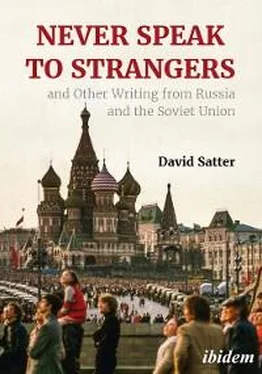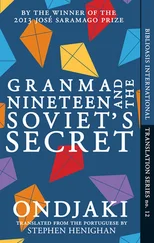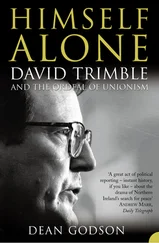In a clear, confident voice, Father Dudko began reading a confession in which he renounced his previous dissident activities, praised the Soviet authorities for their humanity and said that he now recognised that his struggle against atheism had been a struggle against Soviet power.
When Father Dudko finished people began calling each other in Moscow’s dissident and intellectual community. Father Dudko was the religious counsellor and friend to most of Moscow’s liberal intelligentsia, and one historian later described his recantation as an “inexpressible blow.”
The confession of Father Dudko, however, did not signal the start of a new campaign against religion but, on the contrary, was followed by intensification of the preparations of religious facilities for the 1980 Olympics. Long neglected Russian Orthodox churches were being restored, crosses erected and icons lit to demonstrate Soviet respect for religious faith.
The irreconcilability between Father Dudko renouncing his beliefs on nationwide television and the final touches being put on the restored cupolas of Russian Orthodox churches is symbolic of the problems foreigners will experience in understanding a society which invests enormous energy in creating a false facade to conceal the ideology which guides it.
More than 30,000 western tourists have come to Moscow for the 1980 Olympics and the overwhelming likelihood is that the impression they will take away with them will be based on the false front, not the ideological reality.
The buildings on main Olympic routes have been repainted, drunks, hooligans and others likely to make public scenes have been exiled, attractive Soviet guides who have been carefully screened will aid foreign visitors and a full cultural programme has been arranged. Meanwhile the ubiquitous police—both uniformed and plain-clothed varieties—will discourage chance encounters in the street.
The Soviet authorities believe that Western visitors to the Soviet Union generally have no interest in probing deeply into Soviet life and will draw their conclusions on the basis of what is visible. The Soviets therefore set out to organise what the visitors will see.
The Olympic Games will be a net gain for the Soviet authorities in the political sense if the vast majority of foreign visitors never give any thought to the ideological essence of Soviet society and assume that in the Soviet Union too, appearances reflect reality.
The foreign visitor—who buys expensive Olympic souvenirs in Soviet dollar shops, travels in an Intourist car, attends the Bolshoi ballet and the Olympic events and admires the golden cupolaed churches which have been carefully restored—may easily return home to tell friends that the Soviet Union is little different from countries in the West.
The western visitor to Moscow may notice that older people are better dressed than he had imagined. But this will be less important than the fact that some of those strolling past him on Kallinin Prospekt are former labour camp prisoners who adopted, as a result of their experiences, the fundamental assumptions of the Soviet “new man.”
The experience of having been arrested, serving 15 years in a Siberian labour camp and then being freed, rehabilitated and restored to one’s previous position as if nothing had happened teaches a man one of totalitarianism’s basic rules—that his actions do not always influence his fate.
The Soviets have tried to create an environment for western visitors in which they will feel comfortable and which they will compare to their own. Having arrived at a gleaming airport built by the West Germans, the western visitors will be quickly taken to luxury hotels and offered the opportunity to participate in familiar activities such as group excursions, buying parties and theatre tours.
The visitor, however, will learn more about Soviet society far away from the tourist facilities. Although it is off the beaten path, the visitor may gain a feel for the way in which totalitarianism made people interchangeable in the Soviet Union by taking a walk in the dimly lit heart of 19th century Moscow.
Watching the reflection of the street lamps on the motionless surface of Patriarch’s Pond, it is easier to understand that the Soviet Union is a country where a figure stepping out of the shadows for a solitary midnight stroll could, with equal ease, have spent his life as a high Soviet official or as an “enemy of the people and saboteur.”
The Soviet Union was not always so diffident about its ideology or so anxious to make bourgeois westerners feel at home. But ideological fervour has slowly drained away to be replaced by ordinary careerism which must nonetheless realise its goals within the established ideological structure. The result is a surrealistic situation which helps explain why the Soviets prefer to conceal the state of their ideological ambiguity behind a protective facade.
The techniques being used to create an atmosphere of normality for Olympic tourists are aimed at misleading journalists, businessmen and Heads of State. Soviet political culture was shaped by Marx and Lenin’s unflattering view of the western bourgeoisie. If the West feels baffled by the Soviet Union this is partially because the Soviet authorities have more confidence in their ability to maintain a misleading facade than in their capacity to defend themselves as an ideological movement.
According to Marxist-Leninist ideology, the elimination of private ownership did away with the basis for social differences which are always class-based. The Soviet Union therefore should, according to doctrine, demonstrate total unanimity and this unanimity should be completely voluntary. In fact, unanimity does not exist in the Soviet Union but the political structure of the country is organised on the assumption that it does.
One of the rituals through which the supposed unanimity of Soviet society manifests itself are the periodic elections to the Supreme Soviet, the nominal Parliament, in which 99.99 per cent of the population votes in favour of the Communist Party candidate. What really happens during these elections, however, is that people vote because they fear bureaucratic revenge at the hands of the State apparatus which affects every part of their life, if they refuse.
The ritualism in the society is also manifested in “Socialist competitions” which take place at every work place and involve pledges by the workers to increase production or reduce tardiness and so-called “Leninist inventories” among young adults who make promises such as to improve their “moral and cultural level” and report on fulfilment at meetings of the Komsomol, the communist youth organisation a year later.
None of these rituals has any real meaning but they are intended to express the unity and “enthusiasm” of the society and although it is a rare Soviet official who will show any eagerness to discuss these practices, none can afford—in a conversation with a foreigner or even an unknown Soviet citizen—to belittle their significance. The ritual reflects the ideology which is the ultimate justification for Soviet power.
In a situation of ritual adherence to an ideology which has been deprived of substance a special role is created for the use of “hints.” Mr. Naum Meiman, the acting head of the dissident Helsinki Monitoring Group, was puzzled one morning last September, to be called to his neighbourhood party organisation to discuss his longstanding application to emigrate.
Emigration matters would normally have been handled by the Soviet Visa Office. But Mr. Meiman went to the local party headquarters nonetheless where the chairman of the party committee spoke to him about his dissident activities and said, “as a resident of our area, we strongly and persistently advise you to change your behaviour.”
Читать дальше












